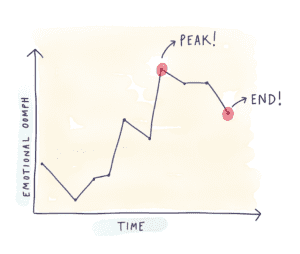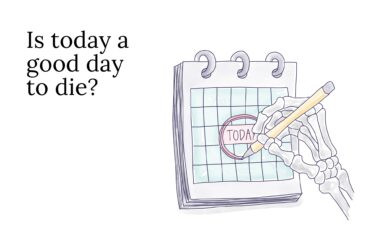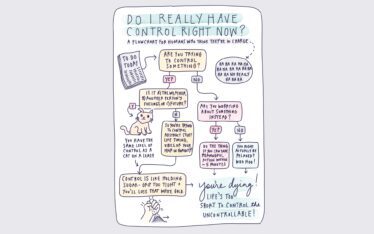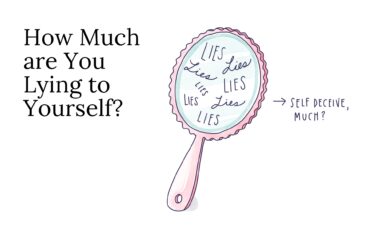Psychology is the best. What other school of thought explains why we prefer things we made ourselves (the IKEA Effect), why we think we’re better than all the other losers out there (the Lake Wobegon Effect), and why there’s always a deadbeat on your team who contributes less than you do (social loafing)?
 Today’s “Positive Psychology Interlude” explains how we cannot be trusted to remember the events that happen to us in any kind of logical fashion. Instead of lamenting how broken our brains are, we’re going to use this sad reality to our advantage and live happier lives in spite of ourselves. Welcome to the Peak-End Theory.
Today’s “Positive Psychology Interlude” explains how we cannot be trusted to remember the events that happen to us in any kind of logical fashion. Instead of lamenting how broken our brains are, we’re going to use this sad reality to our advantage and live happier lives in spite of ourselves. Welcome to the Peak-End Theory.
What is the peak-end theory?
When asked to summarize our perceptions of an experience (like a vacation, a dinner date, a colonoscopy, etc.), you’d think we’d rationally and naturally take our perceived highs and lows and thoughts and feelings into account and then accurately spit a tidy average out. But no. Our memories are fickle and shifty, like sixth grade girls in the schoolyard. Researchers helpfully point out that we continue to not make sense as a human race, because we really only focus on two points in time when retrospectively assessing our satisfaction with an event: the moment of peak emotional intensity, and how the event ended.
 We answer the “how was your vacation” question by zeroing in on the most intense moment (“there was a scorpion in the hotel room!”) and the ending (“Montezuma sought some serious revenge!”)… summing up an otherwise delightful trip with two horrible peak-end moments in time. The amazing ceviche dinner on the beach? Washed away. It’s all about the peak and the end.
We answer the “how was your vacation” question by zeroing in on the most intense moment (“there was a scorpion in the hotel room!”) and the ending (“Montezuma sought some serious revenge!”)… summing up an otherwise delightful trip with two horrible peak-end moments in time. The amazing ceviche dinner on the beach? Washed away. It’s all about the peak and the end.
We answer the “how was the dinner date” question by recalling the highlight moment (“we had chocolate fondue for dessert!”) and the ending (“let’s just say the best dessert was at home afterwards”). The lackluster service at the restaurant? Overshadowed by the chocolate-covered love-fest peak-end moments of the evening.
We answer the “how was your colonoscopy” question — just kidding! No one asks that, nor should they! But researchers did and here’s what happened: patients rated the overall pain of their procedure as lighter if the last few minutes were rigged to be uncomfortable yet not painful… even if the procedure was intentionally elongated by sadistic inquisitive researchers. What can we learn from this shitty (bahaha) example? Endings matter.
How to use the Peak-End Rule to our advantage:
Sit for a moment and reflect on the following two questions:
Question 1: What has been the peak moment of your life so far?
If this feels too hard, because you have so many peaks to choose from, then high five to you and your peak-filled life! (*The rest of us are side-eyeing you right now*)
What moment(s) stand out as highlights? What will you likely remember in your last morphine-dripped deathbed moments? And all snark aside, what can you learn from your peaks-to-date? If your peak was about that time you won a big award in your industry, might you want to pursue even more achievement to keep feeling fulfilled? If your peak was the day you had your first kid, might you want to prioritize family time (and maybe your second kid, just a bit)? Bottom line: take a hint from your high points to-date and replicate those values as much as you can in the ways you spend your time.
Here’s the more important Question 1b: In the spirit of “the best is yet to come,” what are specific peaks you’d like to make happen in the years you have left? I encourage you to make a list of Life Peaks I am Making Happen and then get cracking.
I worked with a team of marketing folks this summer who took this assignment seriously. They drafted their personal “Peaks to Climb” lists, created vision boards (of course they did; what else would a bunch of creative marketers do?), and then presented their plans to one another for a healthy jolt of accountability. One woman booked her flight to run in the Disney Princess Half Marathon during our team session. (Disney encourages runners in this event to “dress in your royal best, don your fanciest tutus and tiaras, sprinkle in some pixie dust and get ready to celebrate all who positively influence others.” No comment.)
Question 2: What will the end of your life be like?
Wait, what? (*Insert record scratch sound here*)
If you bit the biscuit right now (well, if you bit if after finishing this article… hold on for a few more minutes, Sparky), how would you feel about the End of Your Life as You’ve Known It? Would these last few days/ weeks feel like a positive “end” to cap off your time on the planet? Knowing that the end is such a BFD, would you float in the clouds feeling like you nailed the ending, or that it felt sort of meh?
I know it’s a somewhat silly exercise to wonder how we’ll feel about the way our lives ended when we’re dead — a time when presumably no one will ask us to rate our satisfaction with the life we lived — but you never know? At the very least I thank you for suspending disbelief and playing along.
If we’re going to naturally warp our memories because of our bias to zero in on the peak + end, why not rig the ending? Why not end on a high note? (No this is not an endorsement to go on a hedonic bender and then take a poison pill to ensure a happy ending.) Why not plan a life you love (or at least like a lot), so that we’re prepared at any moment to die on a high?
The good news is that however you answered Question 1b above (ways you’d like to engineer more peaks) will help with the conundrum of planning for your epic ending. If we’re climbing more peaks, we’re likelier to die on a peak (or at least climbing up one).
I want to get to the end with an assortment of peaks to choose from, and an end that makes me feel like I did this life justice — like I gave two shits, like I treated today like it mattered, like I didn’t put off living because of a fanciful notion that I’ve got miles and miles of runway ahead of me (when I really might have just 36 hours?). I want all this for you too… I want you to ascend peak after peak, and have one hell of a happy ending… even if it is perfectly rigged.

P.S.: Oh and just in case you missed it… I’d love you forever if you took 16 minutes out of your life to watch my TEDx talk!






